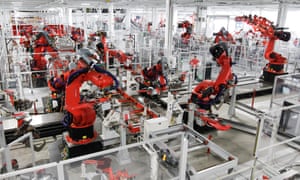Tesla
California base faces claims of unreported injuries as it struggles to roll out Model 3

Customer deliveries of the Model 3 have been delayed by the production problems.
Photograph: Justin Pritchard/AP
Tesla is facing an investigation by Californian safety regulators into reports of serious injuries at its factory in Fremont, California, where it is struggling to scale up production of its Model 3 mass-market electric car.
The California Occupational Safety and Health Administration said on Wednesday it had begun an inspection on Tuesday, a day after the news website Reveal alleged that Tesla failed to disclose legally mandated reports on serious worker injuries, making its safety record appear better than it was.
A Tesla spokesperson said the Californian agency was required to investigate any claims, whether merited or not. They said: “We have never in the entire history of our company received a violation for inaccurate or incomplete injury record-keeping.”
The agency typically reviews an employer’s log of work-related injuries and illnesses to ensure serious injuries are reported directly to the administration within eight hours. Tesla said the injury rate at its Fremont factory, which it took over from General Motors and Toyota, was half what it was in the final years under its previous owners.

Robots assembly a Tesla Model S at the firm’s factory in Fremont, California. Photograph: Paul Sakuma/AP
But this is just the latest issue in what Tesla’s chief executive, Elon Musk, described as “manufacturing hell”, as the company struggles to hit production targets for its crucial new car.
The firm has repeatedly failed to hit its weekly production targets of 2,500 Model 3 vehicles in the first quarter of 2018, and has been forced to halt production twice in three months, most recently this week. The difficulties have fostered doubt within the industry that Tesla will be able to hit its 5,000-a-week target in three months’ time, despite Musk saying the company was able to produce a steady stream of 2,000 vehicles a week at the factory.
The significant production shortfall of the Model 3 has delayed customer deliveries, which have stacked up from billions of dollars of orders. Musk said he was forced to take direct control of the production line at the beginning of April, working through the night and sleeping at the factory.
The technology entrepreneur admitted “excessive automation” had slowed production, saying a “crazy, complex network of conveyor belts” had not worked out. “Humans are underrated,” Musk said.